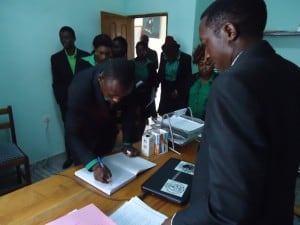
The ERuDeF Institute of Biodiversity and Non-profit Studies (EIBiNS) has sworn in eight new future conservation experts into the institute.
The trainees were officially admitted into key specializations like Biodiversity Conservation, Agroforestry Management, Environmental Education, Environmental Journalism and NGO & Fundraising Studies for the Professional Bachelor Degree (PBD) and the Professional Masters Degree (PMD).
The matriculation ceremony took place Saturday, February 21, 2015 at the ERuDeF Institute campus, Mile 18 Buea. It was attended by among others, the Southwest Regional Delegate of Environment, Protection of Nature and Sustainable Development, the CEO of ERuDeF, a representative of St. Monica University, EIBiNS administrative and teaching staff, and trainees’ parents.
In his welcome speech, the ERuDeF Institute Deputy Director, Samuel Ngueping, exhorted the freshmen to take their studies seriously so that upon graduation, they would have harnessed enough skills to address the numerous challenging environmental problems plaguing the country and the world at large.
Ngueping reassured the trainees of the quality of faculty and training package the ERuDeF Institute has in store for them.
He implored the aspiring conservationists to respect the institute’s rules and regulations. He commended parents and guardians on their commitment towards the education of the trainees, calling on them to collaborate with the institute for the effective training of their children.
The Research Officer at Business Unit of the University of Buea, Diffang Funge, who doubles as senior lecturer at the Department of Journalism and Mass Communication, in an academic discourse, underscored the harmful effect of human activity on the environment.
He entreated the trainees to make the best of their studies at EIBiNS to reverse this predicament.
“Each passing day, I keep thanking God for making me choose this institute. I have always had the passion for agroforestry because I wanted to know more about farming that does not inflict damage on the environment, but I had no clear idea of a perfect place. After being at EIBiNS for just a few months, I think the difference is clear; the ERuDeF Institute is distinctive in its pragrammes and quality of training,” said Ebot Thomas, a PMD Agroforestry trainee.
A Biodiversity Conservation trainee, Gwendoline Angwa, said, “My studies at EIBiNS have really created a sense of direction and focus in my life compared to my university days. Now I am proud to say that I know where am going to; I am already feeling like a conservationist especially after the field work I did at the newly created Tofala Hill Wildlife Sanctuary.”
The ERuDeF Institute was created in 2012 to provide leading edge and holistic professional training in conservation development management to the future cream of conservation development leaders in Cameroon and beyond.
The Institute offers a two-year intensive Professional Masters Degree (PMD) program for students with at least a Bachelors degree and a four-year Professional Bachelor Degree (PBD) program for Advanced Level holders.
The exit diplomas from the ERuDeF Institute include a National Diploma (at end of first year), a Higher National Diploma (end of third year) and the professional Bachelor Degree (at the end of fourth year). The post graduate training leads to the award of a master degree with intermediary diplomas being a postgraduate certificate and diploma.
By Bertrand Shancho Ndimuh



